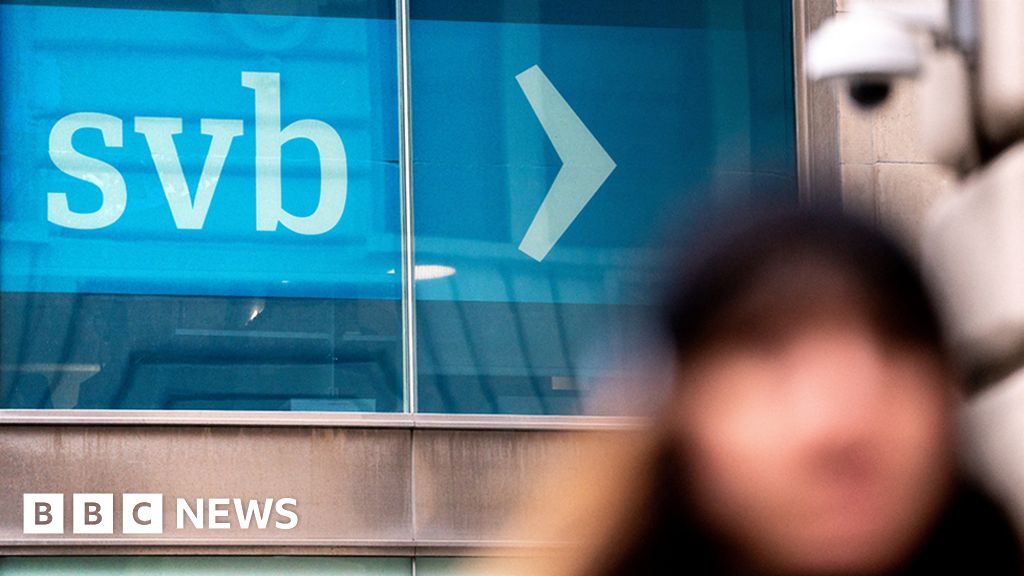Moody's Warns Of More Pain For US Banks As Downgrades Sector

Is this the start of a financial crisis?
Ratings giant Moody's has warned of more pain ahead for the US banking system after a run on deposits led to the collapse of Silicon Valley Bank.
Moody's cut its outlook for the sector to "negative" from stable, warning of "a rapid deterioration in the operating environment".
The downgrade came as banking shares in the US and Europe rebounded following earlier losses.
But Moody's said some other banks faced risks of customer withdrawals.
It said rising interest rates also pose a challenge, exposing banks that bought assets such as government bonds when interest rates were low, to potential losses.
"Banks with substantial unrealized securities losses and with non-retail and uninsured US depositors may still be more sensitive to depositor competition or ultimate flight," Moody's said in the report.
"We expect pressures to persist and be exacerbated by ongoing monetary policy tightening, with interest rates likely to remain higher for longer until inflation returns to within the Fed's target range."
Authorities have acted quickly to try to contain fallout after the shock collapse of Silicon Valley Bank (SVB), the 16th largest in the US.
The firm, a key lender to technology firms, failed last week after a rush of customer withdrawals, sparked by the bank's disclosure that it needed to raise money and had been forced to sell a portfolio of assets, mostly government bonds, at a loss.
US regulators took over the bank and said they would guarantee deposits beyond the $250,000 level typically insured by the government. They took similar steps at smaller Signature Bank.
Officials from the Department of Justice and Securities and Exchange Commission are now investigating the collapse, US media reported.
Reports have suggested that some customers of smaller US banks have been trying to put their money into bigger institutions.
However, ratings agency S&P Global said it hadn't seen evidence of runs on banks other than at those that had collapsed.
It said emergency measures brought in by the Federal Reserve should lower the risk of bank customers losing confidence.
However, it added that "conditions remain fluid" and "some banks are showing greater signs of stress than others", including First Republic bank.
Analysts expect the turmoil in the financial system sparked by the failures to lead the Fed to slow or pause its rate rises when it meets next week.
That view gained traction on Tuesday after the latest inflation report showed prices in the US up 6% in the 12 months to February, in line with expectations, helping to boost shares.
As trading began on Tuesday, San Francisco-based First Republic Bank - which had seen its share price tank by 62% on Monday - jumped more than 50%, one of a number of firms whose shares were staging a recovery. It ultimately closed roughly 30% higher.
The three main stock indexes also climbed, with the Dow up 1%, the S&P 500 climbing 1.7% and the Nasdaq ending the day more than 2% higher.
In the UK, bank shares - which saw sharp falls on Monday - were all mostly higher by Tuesday afternoon. The FTSE 100 ended up roughly 1.2%.
The European Stoxx banking index also opened lower on Tuesday but then recovered to end nearly 3% higher.
But shares in HSBC, which rescued SVB's UK business for £1, closed down 1%, and there were steep losses overnight in Japan, where major lenders such as the country's largest bank MUFG, saw their share prices tumble by more than 8%.
An index of Japanese banking stocks, known as the Topix Banks Index, plunged by 7.4%, despite reassurances from the Bank of Japan (BoJ).
"Japanese financial institutions' direct exposure to Silicon Valley Bank is small, and thus the impact is likely limited," said a BoJ official.
From Chip War To Cloud War: The Next Frontier In Global Tech Competition
The global chip war, characterized by intense competition among nations and corporations for supremacy in semiconductor ... Read more
The High Stakes Of Tech Regulation: Security Risks And Market Dynamics
The influence of tech giants in the global economy continues to grow, raising crucial questions about how to balance sec... Read more
The Tyranny Of Instagram Interiors: Why It's Time To Break Free From Algorithm-Driven Aesthetics
Instagram has become a dominant force in shaping interior design trends, offering a seemingly endless stream of inspirat... Read more
The Data Crunch In AI: Strategies For Sustainability
Exploring solutions to the imminent exhaustion of internet data for AI training.As the artificial intelligence (AI) indu... Read more
Google Abandons Four-Year Effort To Remove Cookies From Chrome Browser
After four years of dedicated effort, Google has decided to abandon its plan to remove third-party cookies from its Chro... Read more
LinkedIn Embraces AI And Gamification To Drive User Engagement And Revenue
In an effort to tackle slowing revenue growth and enhance user engagement, LinkedIn is turning to artificial intelligenc... Read more

